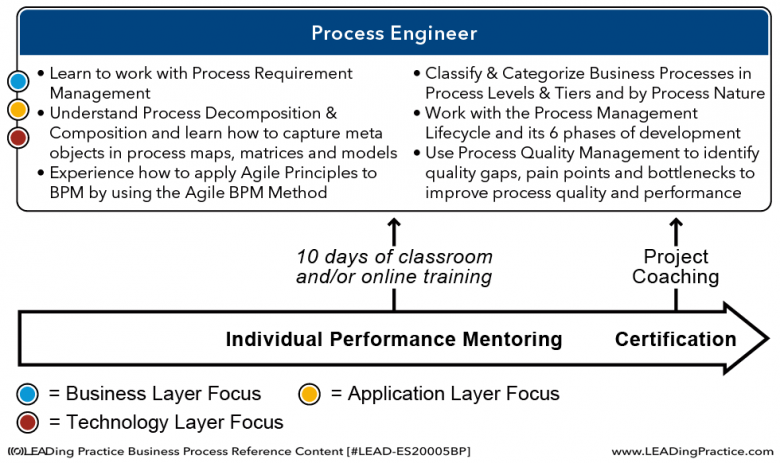Program Duration
Ten working days.
Target Audience
This certification program has been designed for professionals with 3–10 years of experience:
- Specialists:
The engineering specialist who needs process knowledge, such as a systems engineer, quality engineer, or software engineer - Consultants:
Engineering consultants (depending on whether it is an engineering-centric organization) - Architects:
Process architects (depending on whether it is an engineering-centric organization) - Managers:
Process managers (depending on whether it is an engineering-centric organization)
Program type
The ideal program type is to combine classroom training (physical location) with online training, depending on the size and location of the process team. The first week is an optional choice (classroom or online); the second week is always classroom.
The process engineer certification program has been structured to build on the existing competencies of the practitioner, but most importantly, with a main focus on developing new skills through the use of our unique engineering principles. Process engineers focus on the design, operation, control, and optimization of business, application, and technology processes. They use specific engineering principles to enable better enterprise-related processes. Process engineering training therefore focuses on the daily job of the process engineer:
- Construct and maintain the endeavor-specific process from the process landscape
- Evaluate process tools for consistency with the organizational process landscape and process life cycle and/or endeavor-specific process
- Ensure that the endeavor-specific process is constructed based on endeavor specific needs before process tool selection rather than being driven by early selection of a potentially inappropriate process tool
- Provide input to the environments team regarding required process tool support
- Provide local guidance and mentoring in the proper adoption and use of the endeavor process
- Identify and document the enterprise’s own leading practices; disseminate and evangelize industry best practices and common best practices
- Work to support strategic process initiatives including recommending improvements to the organizational process framework
- Support multiple endeavors within a local region
- Staff regional process help desks
- Present local training on process-related topics
- Research advances in process engineering (e.g., new software development methods)
The aim is also to infuse the practitioner with a supporting process way of thinking, working, and modeling with business processes. This is done through 10 days of intensive classroom and/or online training, in-depth tutoring, and coaching, coupled with hands-on project experience in which the practitioner applies the acquired process engineering (Figure 1) techniques and its related disciplines to the practitioner’s own company projects.
Content of the Program
The process engineer certification program provides the practitioner with an extensive tool kit and profound knowledge of the LEAD enterprise standards and industry standards as well as highly detailed and descriptive process and engineering reference content that links and connects directly to topics such as:
- Process analysis techniques
- Process requirement management
- Process design practices and concepts
- Process decomposition and capturing in process templates/models
- Process composition and capturing in process templates/models
- Process categorization and classification
- Process levels
- Process tiers
- Process nature
- Process life cycle management
- Process quality management
- Agile business process management (BPM)
These topics have already been covered extensively throughout this handbook, and the process engineer certification program aims to deliver actual, practical, and hands-on experience by using all of these disciplines in the context of real-life process-oriented projects. This ensures the highest level of knowledge transfer and skills building to meet today’s organizations’ cross-disciplinary competency requirements for professionals involved with process-oriented subjects.
Process Engineer Learning Model
The process engineer learning model (see figure) is based on an intensive training module supported by in-depth individual performance mentoring on a selected project. The hands-on learning experience ensures that the business process management and process engineering skills are applied within the following disciplines:
Needed skills at an abstraction level for a process engineer are:
- Conceptual: theoretical, abstract, and intangible—high-level description of the logical
- Context: situation, milieu/environment, and perspective
- Concrete: tangible, existing, and actual
- Descriptive and specification: explanation, depiction/sketch, and portrayal, often using a map, matrix, and/or model
- Design: plan, intend, and aim
- Execution: completing, performing, and realization
What the Practitioner Gets
- This certification program includes:
- Ten working days of classroom and online training
- Six 1.5-hour digital online sessions
- Individual performance coaching for project and individual development during the course
- Training material with practical and usable reference content (i.e., the BPM life cycle, process templates)
- Process engineer certificate
Location & Dates
- 4-08 June 2016: Ottawa, Canada
- 12-16 September 2016: Washingston DC, USA
- 17 – 21 October 2016: Sheffield, United Kingdom
Process eXpert certification dates:
- 30 Oct – 04 December 2016: Stockholm, Sweden
- 25-29 April 2016: Amsterdam, Netherlands
- 10-14 October 2016: Saarland University
- 14-18 November 2016: Chicago, USA

